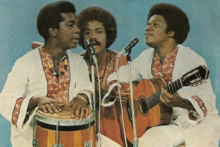Os Tincoãs
Os Tincoãs | |
|---|---|
 Os Tincoãs in 1976 | |
| Background information | |
| Origin | Cachoeira, Bahia, Brazil |
| Genres | MPB |
| Years active | 1960–2000 |
| Past members | Mateus Aleluia, Heraldo, Dadinho and Badú. |
| Website | tincoas |
Os Tincoãs were a Brazilian popular music band from Bahia, primarily active in the 1960s and 1970s. They are named after the Tincoã bird, a subspecies of the Squirrel Cuckoo native to Brazil. The music of Os Tincoãs was heavily influenced by Bahia's Candomblé tradition.
Surviving member Mateus Aleluia is still very active in singing and songwriting. Aleluia moved to Angola in 1983 where he began to develop a cultural research project for the Angolan government. In 2002 he returned to Brazil and in 2010 he debuted with "Cinco Sentidos", his first solo album, produced by the Garimpo label and sponsored by Petrobrás. In 2017 he released "Fogueira Doce", a new album produced independently.[1]
Badú is also a surviving member, who joined Os Tincoãs in 1975 remaining till 1983. He has been living in Gran Canaria island, Spain, for the last 30 years.
In 2023, an album of material recorded 40 years ago, “Canto Coral Afrobrasileiro,” was released.[2] It received an honorable mention by the Associação Paulista de Críticos de Arte in their list of the 50 best Brazilian albums of 2023.[3]
Discography
- 1961 – Meu Último Bolero
- 1973 – Os Tincoãs
- 1975 – O Africanto dos Tincoãs
- 1977 – Os Tincoãs
- 1982 – Os Tincoãs Especial
- 1986 – Dadinho e Mateus
- 2017 – Nós, Os Tincoãs
- 2023 – Canto Coral Afrobrasileiro
References
- ^ Compositores, União Brasileira de. "Mateus Aleluia lança segundo disco solo" (in Brazilian Portuguese).
{{cite journal}}: Cite journal requires|journal=(help) - ^ Albuquerque, Carlos (2023-09-19). "Os Tincoãs Were Almost Forgotten. A New Generation Found Their Music". Retrieved 2023-09-24.
- ^ Barros, Adriana de (19 January 2024). "APCA divulga os 50 melhores álbuns nacionais de 2023". TV Cultura (in Portuguese). São Paulo: Fundação Padre Anchieta. Retrieved 15 December 2024.
External links
